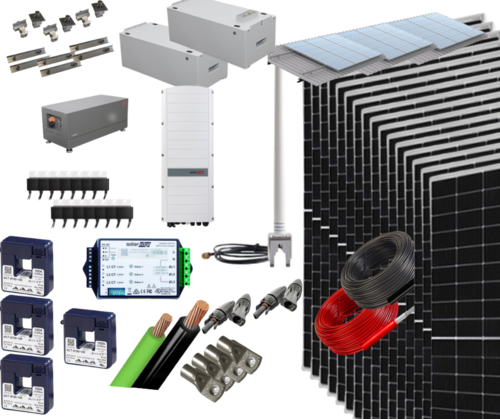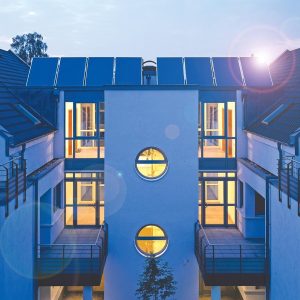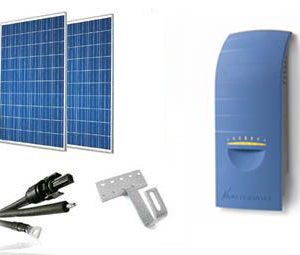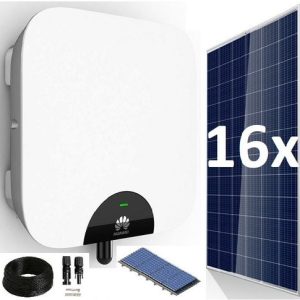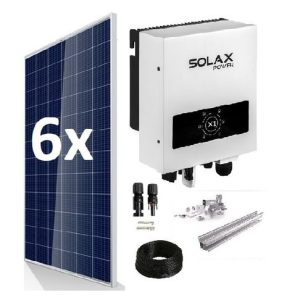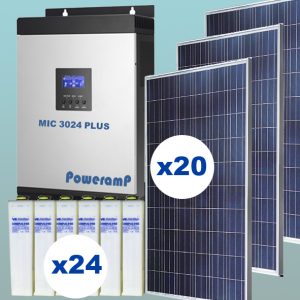The 7000W SolarEdge 36000Whdia Self-Consumption Three-Phase Kit, a direct three-phase network that generates electricity during sunny hours.
System characteristics of the Three-Phase Self-consumption Kit 7000W SolarEdge 36000Whdia
The photovoltaic system provided in the attached file can generate 21.84 kWh per day in winter (3 hours of sun) and 50.96 kWh in summer (7 hours of sun).
The characteristics of the proposed system are the following:
Installed solar generation: 7,280 W
Daily production in winter: 21.84 kWh
Summer: daily production: 50.96 kWh
Annual average daily production: 36.40 kWh
Components of the Three-phase Self-consumption Kit 7000W SolarEdge 36000Whdia
16 x Solar Panel 455W JA Solar Mono PERC: guaranteed for 25 years and made of monocrystalline silicon from the famous international brand JA Solar. It offers one of the best products for our photovoltaic systems, as it is one of the best-performing monocrystalline models with excellent value for money. It can supply the solar system with about 1,350 Wh per day in winter and almost twice as much in summer. PERC technology with high performance monocrystalline half cells offers more than 20% efficiency for the module size. It measures 2112 x 1052 x 35mm and includes a junction box for each positive and negative wire with MC4 connectors on each end. The solar module includes an attached aluminum frame that allows it to be attached to any structure, allowing for additional dimensions.
2 x Falcat Universal Union Kit up to 45mm: contains all the necessary elements to connect the solar panels when creating a solar system with structures. This kit is specially designed to join two Falcat structures prepared for panels with a profile thickness of up to 45mm.
1 x Structure 4 Panels 30-45mm Coplanar Falcat: support to allow the placement of 4 solar panels on the roof with the correct slope and orientation. The panels are placed perpendicular to the structure and have the same slope as the surface on which they are installed. In this case, the structure is designed for panels of any length and has a universal press that accepts panel profiles from 30 to 45 mm. This is the most suitable type of construction for metal roofs, sandwich panels or concrete slab roofs. The product is supplied in a single package and can be connected to multiple structures of the same type using the appropriate connection kit.
2 x Structure 6 Panels 30-45mm Coplanar Falcat: support to allow the placement of 6 solar panels on the roof with the correct slope and orientation. The panels are placed perpendicular to the structure and have the same slope as the surface on which they are installed. In this case, the structure is designed for panels of any length and has a universal press that accepts panel profiles from 30 to 45 mm. This is the most suitable type of construction for metal roofs, sandwich panels or concrete slab roofs. The product is supplied in a single package and can be connected to multiple structures of the same type using the appropriate connection kit.
1 x BYD BASE Lithium Battery (PDU) for Premium LVS: This control unit or PDU is part of the BYD Battery-Box Premium LVS modular low voltage battery and is used to form a BYD lithium storage system for photovoltaic systems or solar. Installed in groups of 1 to 6 LVS battery modules.
2 x BYD Lithium Battery Premium LVS Module: The BYD Premium LVS Lithium Battery is a 4 kWh module, it is used to form a BYD lithium energy storage system compatible with single-phase and three-phase inverters for photovoltaic or photovoltaic systems. You can group up to 6 LVS battery modules.
1 x StorEdge 7000W SolarEdge Three Phase Inverter – The StorEdge series of SolarEdge three-phase inverters are among the most advanced inverters on the market. This is because the role of the inverter is effectively reduced to the integration of direct current converters, each of which uses panel optimizers to provide maximum performance. Take out each module and feed the inverter with power. Since power is converted in real time for consumption, grid-tied systems can operate without batteries, significantly reducing system costs if there is a predominantly daytime consumption pattern. If not, you can add a 48V lithium technology battery to this inverter. This makes the surplus production available later when the sun is not shining, making it more independent of the grid. It is recommended that at least the investor rating be integrated into the panel, unless there are plans for future expansion. You can choose to store this energy by supplementing the surplus electricity generated with batteries or send it to the grid thanks to an energy meter that you place at the entrance to the grid in your home. Energy is needed to adapt the output power of the inverter to the current consumption. With IP65 protection and a weight of 37 kg, it can be installed indoors or outdoors.
16 x SolarEdge P505 Optimizer: necessary items for installation with SolarEdge inverters when installing modules of more than 400W. An optimizer must be installed on each solar panel that has a string that connects to an inverter. Suitable for 60 or 72 cell panels, this P505 model supports up to 505W of power. It comes with a frame prepared to facilitate mounting on the rear profile of the solar panel. Two sets of MC4 connectors, one of which connects to the solar panel and the other to the string that connects to the inverter.
1 x SolarEdge Wi-Fi Antenna – Monitor and configure SolarEdge inverters without display, including HD Wave and Compact inverters. It includes the necessary cables to make a correct connection and has a 5-year guarantee.
1 x SolarEdge Energy Meter Modbus: The energy metering system is used to deliver the required power to the SolarEdge inverters at all times. For this reason, it is important to comply with Spanish regulations by not sending excess production to the network. Thanks to this system, the output power of the inverter is automatically adjusted in case the power generated by the module is higher than the energy demand at a given moment. In this way, the meter sends the appropriate signal to the inverter to control the energy that feeds the electrical installation. This device is also necessary when batteries are installed in direct self-consumption systems. This is because if there is a surplus of solar energy, this energy is used instead of reducing electricity by not injecting it into the grid. The inverter steps up to charge the battery and provides us when things change.
1 x Roll Unifilar Cable 6mm2 H1Z2Z2-K 30m red: special for electrical installations. Halogen-free flexible power cables for the most demanding industrial requirements.
1 x Roll Unifilar Cable 6mm2 H1Z2Z2-K 30m black: special for electrical installations. Halogen-free flexible power cables for the most demanding industrial requirements.
1 x Single-wire cable 50 mm2 POWERFLEX RZ-1K Green: special for electrical installations. Halogen-free power cable. It is a flexible power cable designed for the most demanding industrial needs such as: low voltage industrial connections, urban networks, building installations.
1 x 50 mm2 Single Wire Cable, POWERFLEX RV-K Black: special for electrical installations. Halogen-free power cable. It is a flexible power cable designed for the most demanding industrial needs, such as: low voltage industrial connections, urban networks, building installations.
2 x WEIDMULLER PVStick Connectors – Most recommended if you don’t have crimp tools that can connect normal MC4 connectors. They are compatible with all connector models that come standard with solar panels and do not require tools to connect to the cable.
4 x 50mm Cable Eye Terminal – 8mm Eye: used to crimp 50mm gauge cables and connect 8mm diameter bolts.
3 x SolarEdge 100A, 50Hz Toroidal Clamp: a necessary component to be able to measure the power consumed in each stage of an electrical installation. This information is collected by energy meters to determine in real time the energy demand of each phase of the electrical installation.

